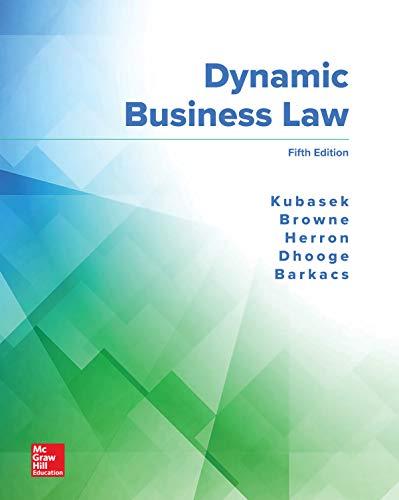In 1984, Irving Duke prepared a holographic will in which he left all of his property to
Question:
In 1984, Irving Duke prepared a holographic will in which he left all of his property to his wife Beatrice. He left one dollar to his brother Harry and disinherited all other persons. The will provided that should Irving and Beatrice die at the same time, then the estate was to be divided equally between two charities, specifically, the City of Hope (COH) in memory of Irving’s sister Rose Duke Radin and the Jewish National Fund (JNF) to plant trees in Israel in memory of Irving’s parents. The will appointed Beatrice as its executrix. The will contained no provision addressing the disposition of Irving’s estate if he outlived Beatrice nor appointed a successor executor in such circumstances. Beatrice died in July 2002. Irving died in November 2007, leaving no spouse or children.
In March 2008, the COH and JNF petitioned for probate and for letters of administration. In October 2008, Robert and Seymour Radin (the Radins) filed a petition for determination of entitlement to estate distribution. The Radins were the sons of Irving’s sister Rose. The Radins claimed that the estate must pass to Irving’s closest surviving intestate heirs, the Radins, because Irving did not predecease Beatrice, nor did Irving and Beatrice “die at the same moment,” and there was no provision in the will for disposition of the estate in the event Irving survived Beatrice. COH and JNF offered extrinsic evidence to prove that Irving intended the will to provide that in the event Beatrice was not alive to inherit Irving’s estate when Irving died, the estate would be distributed to COH and JNF. The probate court concluded that the will was unambiguous, and it declined to consider extrinsic evidence of Irving’s intent. The probate court thus ruled in favor of the Radins. The California Court of Appeal affirmed the probate court’s decision based on the California Supreme Court’s previous opinion in In re Estate of Barnes, 407 P.2d 656 (Cal 1965), in which the Court severely restricted the use of extrinsic evidence in will contests. The California Supreme Court granted review of the dispute between the Radins, COH, and JNF in order to reconsider its opinion in Barnes. Should the court admit extrinsic evidence in order to determine Irving’s intent? Why or why not?
Step by Step Answer:

Dynamic Business Law
ISBN: 9781260247893
5th Edition
Authors: Nancy Kubasek, M. Neil Browne, Daniel Herron, Lucien Dhooge, Linda Barkacs





